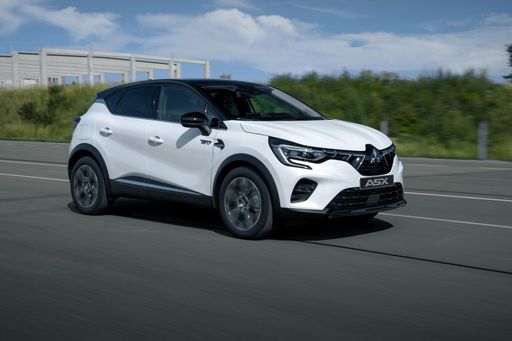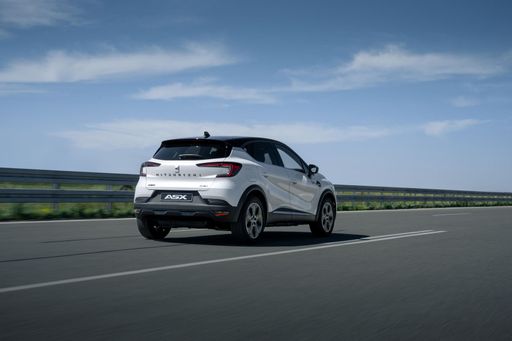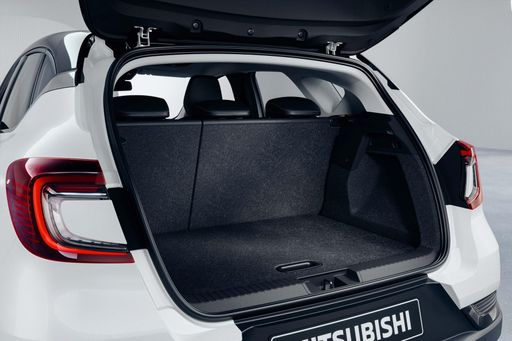Mitsubishi ASX vs Toyota Yaris - Differences and prices compared
Compare performance (158 HP vs 280 HP), boot space and price (20600 £ vs 21900 £) at a glance. Find out which car is the better choice for you – Mitsubishi ASX or Toyota Yaris?
Costs and Efficiency:
Price and efficiency are often the first things buyers look at. Here it becomes clear which model has the long-term edge – whether at the pump, the plug, or in purchase price.
Mitsubishi ASX has a hardly perceptible advantage in terms of price – it starts at 20600 £, while the Toyota Yaris costs 21900 £. That’s a price difference of around 1295 £.
Fuel consumption also shows a difference: Toyota Yaris manages with 3.80 L and is therefore somewhat more efficient than the Mitsubishi ASX with 4.40 L. The difference is about 0.60 L per 100 km.
Engine and Performance:
Power, torque and acceleration are the classic benchmarks for car enthusiasts – and here, some clear differences start to show.
When it comes to engine power, the Toyota Yaris has a clearly edge – offering 280 HP compared to 158 HP. That’s roughly 122 HP more horsepower.
In acceleration from 0 to 100 km/h, the Toyota Yaris is significantly quicker – completing the sprint in 5.50 s, while the Mitsubishi ASX takes 8.50 s. That’s about 3 s faster.
In terms of top speed, the Toyota Yaris performs distinct better – reaching 230 km/h, while the Mitsubishi ASX tops out at 180 km/h. The difference is around 50 km/h.
There’s also a difference in torque: Toyota Yaris pulls distinct stronger with 390 Nm compared to 270 Nm. That’s about 120 Nm difference.
Space and Everyday Use:
Cabin size, boot volume and payload all play a role in everyday practicality. Here, comfort and flexibility make the difference.
Both vehicles offer seating for 5 people.
In curb weight, Toyota Yaris is slightly lighter – 1090 kg compared to 1296 kg. The difference is around 206 kg.
In terms of boot space, the Mitsubishi ASX offers decisively more room – 484 L compared to 286 L. That’s a difference of about 198 L.
In maximum load capacity, the Mitsubishi ASX performs convincingly better – up to 1596 L, which is about 661 L more than the Toyota Yaris.
When it comes to payload, Toyota Yaris somewhat takes the win – 525 kg compared to 449 kg. That’s a difference of about 76 kg.
Who comes out on top?
Overall, the Toyota Yaris shows itself to be is largely superior and secures the title of DriveDuel Champion.
It convinces with the more balanced overall package and proves to be the more versatile choice for everyday use.

Toyota Yaris
Costs and Consumption
View detailed analysis
Engine and Performance
View detailed analysis
Dimensions and Body
View detailed analysis
Mitsubishi ASX
The Mitsubishi ASX is a compact crossover that mixes practicality with a no-nonsense personality, making it an easy choice for buyers who want sensible space without the showroom theatrics. It won't set your pulse racing, but its composed ride and user-friendly kit make it a dependable companion for daily errands and weekend escapes — reliable rather than flashy.
details



Toyota Yaris
The Toyota Yaris is a sprightly city hatch that packs clever packaging, surprising comfort and fuel-sipping manners into a neat, easy-to-park package. It rewards sensible buyers with low running costs, friendly ergonomics and a forgiving drive, delivered with Japanese reliability and just enough personality to make errands feel a little less ordinary.
details

Costs and Consumption |
|
|---|---|
|
Price
20600 - 32500 £
|
Price
21900 - 46700 £
|
|
Consumption L/100km
4.4 - 6 L
|
Consumption L/100km
3.8 - 9.5 L
|
|
Consumption kWh/100km
-
|
Consumption kWh/100km
-
|
|
Electric Range
-
|
Electric Range
-
|
|
Battery Capacity
-
|
Battery Capacity
-
|
|
co2
99 - 135 g/km
|
co2
87 - 215 g/km
|
|
Fuel tank capacity
48 L
|
Fuel tank capacity
36 - 50 L
|
Dimensions and Body |
|
|---|---|
|
Body Type
SUV
|
Body Type
Hatchback
|
|
Seats
5
|
Seats
4 - 5
|
|
Doors
5
|
Doors
3 - 5
|
|
Curb weight
1296 - 1493 kg
|
Curb weight
1090 - 1356 kg
|
|
Trunk capacity
348 - 484 L
|
Trunk capacity
141 - 286 L
|
|
Length
4239 mm
|
Length
3940 - 3995 mm
|
|
Width
1797 mm
|
Width
1745 - 1805 mm
|
|
Height
1575 mm
|
Height
1455 - 1500 mm
|
|
Max trunk capacity
1458 - 1596 L
|
Max trunk capacity
935 L
|
|
Payload
397 - 449 kg
|
Payload
289 - 525 kg
|
Engine and Performance |
|
|---|---|
|
Engine Type
Petrol, Petrol MHEV, Full Hybrid
|
Engine Type
Full Hybrid, Petrol
|
|
Transmission
Manuel, Automatic
|
Transmission
Automatic, Manuel
|
|
Transmission Detail
Manual Gearbox, Dual-Clutch Automatic, Automatic Gearbox
|
Transmission Detail
CVT, Manual Gearbox, Automatic Gearbox
|
|
Drive Type
Front-Wheel Drive
|
Drive Type
Front-Wheel Drive, All-Wheel Drive
|
|
Power HP
91 - 158 HP
|
Power HP
116 - 280 HP
|
|
Acceleration 0-100km/h
8.5 - 14 s
|
Acceleration 0-100km/h
5.5 - 9.7 s
|
|
Max Speed
168 - 180 km/h
|
Max Speed
175 - 230 km/h
|
|
Torque
160 - 270 Nm
|
Torque
390 Nm
|
|
Number of Cylinders
3 - 4
|
Number of Cylinders
3
|
|
Power kW
67 - 116 kW
|
Power kW
85 - 206 kW
|
|
Engine capacity
999 - 1789 cm3
|
Engine capacity
1490 - 1618 cm3
|
General |
|
|---|---|
|
Model Year
2024 - 2025
|
Model Year
2024 - 2025
|
|
CO2 Efficiency Class
D, C
|
CO2 Efficiency Class
B, G
|
|
Brand
Mitsubishi
|
Brand
Toyota
|
What drive types are available for the Mitsubishi ASX?
Available configurations include Front-Wheel Drive.
The prices and data displayed are estimates based on German list prices and may vary by country. This information is not legally binding.




